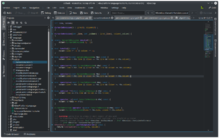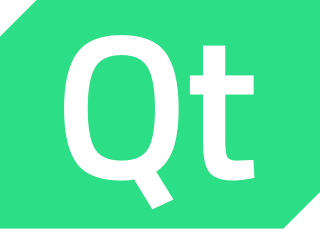
Qt is a cross-platform application development framework for creating graphical user interfaces as well as cross-platform applications that run on various software and hardware platforms such as Linux, Windows, macOS, Android or embedded systems with little or no change in the underlying codebase while still being a native application with native capabilities and speed.
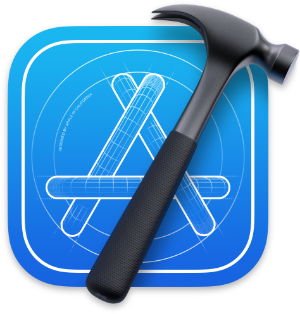
Xcode is Apple's integrated development environment (IDE) for macOS, used to develop software for macOS, iOS, iPadOS, watchOS, tvOS, and visionOS. It was initially released in late 2003; the latest stable release is version 15, released on September 18, 2023, and is available free of charge via the Mac App Store and the Apple Developer website. Registered developers can also download preview releases and prior versions of the suite through the Apple Developer website. Xcode includes command-line tools that enable UNIX-style development via the Terminal app in macOS. They can also be downloaded and installed without the GUI.

SharpDevelop is a discontinued free and open source integrated development environment (IDE) for the .NET Framework, Mono, Gtk# and Glade# platforms. It supports development in C#, Visual Basic .NET, Boo, F#, IronPython and IronRuby programming languages.

KDE Software Compilation 4 was the only series of the so-called KDE Software Compilation, first released in January 2008 and the last release being 4.14.3 released in November 2014. It was the follow-up to K Desktop Environment 3. Following KDE SC 4, the compilation was broken up into basic framework libraries, desktop environment and applications, which are termed KDE Frameworks 5, KDE Plasma 5 and KDE Applications, respectively.
The following tables list notable software packages that are nominal IDEs; standalone tools such as source-code editors and GUI builders are not included. These IDEs are listed in alphabetic order of the supported language.
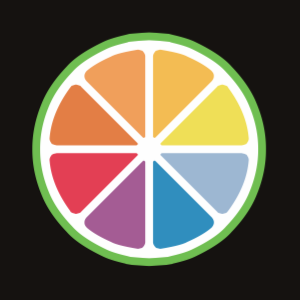
JUCE is an open-source cross-platform C++ application framework, used for the development of desktop and mobile applications. JUCE is used in particular for its GUI and plug-ins libraries. It is dual licensed under the GPLv3 and a commercial license.
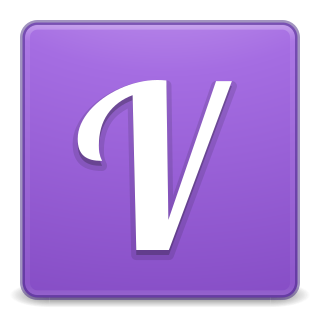
Vala is an object-oriented programming language with a self-hosting compiler that generates C code and uses the GObject system.
Qbs is a cross-platform free and open-source software for managing the build process of software. It was designed to support large, complex projects, written in any number of programming languages, primarily C/C++.

K Desktop Environment 2 was the second series of releases of the K Desktop Environment. There were three major releases in this series.

CodeLite is a free and open-source IDE for the C, C++, PHP, and JavaScript (Node.js) programming languages.

Qt Creator is a cross-platform C++, JavaScript, Python and QML integrated development environment (IDE) which simplifies GUI application development. It is part of the SDK for the Qt GUI application development framework and uses the Qt API, which encapsulates host OS GUI function calls. It includes a visual debugger and an integrated WYSIWYG GUI layout and forms designer. The editor has features such as syntax highlighting and autocompletion. Qt Creator uses the C++ compiler from the GNU Compiler Collection on Linux. On Windows it can use MinGW or MSVC with the default install and can also use Microsoft Console Debugger when compiled from source code. Clang is also supported.

KWrite is a lightweight text editor developed by the KDE free software community. Since K Desktop Environment 3, Kwrite has been based on the Kate text editor and the KParts framework, allowing it to use many of Kate's features.
Dart is a programming language designed by Lars Bak and Kasper Lund and developed by Google. It can be used to develop web and mobile apps as well as server and desktop applications.
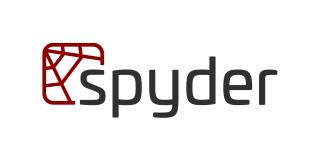
Spyder is an open-source cross-platform integrated development environment (IDE) for scientific programming in the Python language. Spyder integrates with a number of prominent packages in the scientific Python stack, including NumPy, SciPy, Matplotlib, pandas, IPython, SymPy and Cython, as well as other open-source software. It is released under the MIT license.
asm.js is a subset of JavaScript designed to allow computer software written in languages such as C to be run as web applications while maintaining performance characteristics considerably better than standard JavaScript, which is the typical language used for such applications.
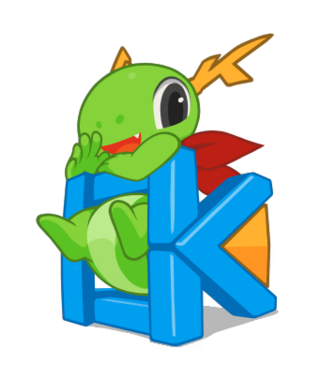
KDE Frameworks is a collection of libraries and software frameworks readily available to any Qt-based software stacks or applications on multiple operating systems. Featuring frequently needed functionality solutions like hardware integration, file format support, additional graphical control elements, plotting functions, and spell checking, the collection serves as the technological foundation for KDE Plasma and KDE Gear. It is distributed under the GNU Lesser General Public License (LGPL).
Felgo is a cross-platform development tool, based on the Qt framework. It can be used to create mobile apps or games. Felgo apps and games are supported on iOS, Android, Windows Phone, embedded devices and desktop devices. Felgo developers use QML, JavaScript and C++ to create mobile apps and games.

The KDE Gear is a set of applications and supporting libraries that are developed by the KDE community, primarily used on Linux-based operating systems but mostly multiplatform, and released on a common release schedule.
